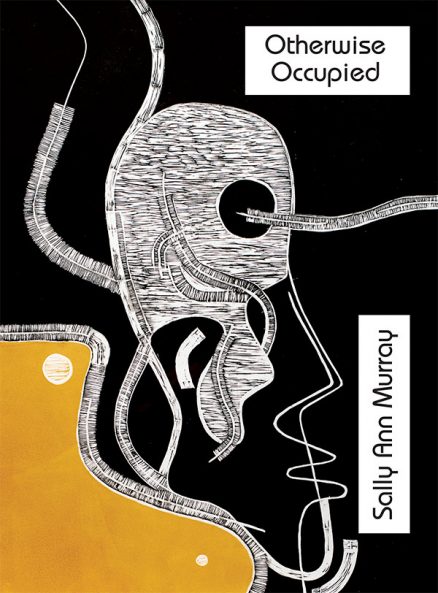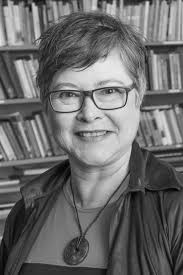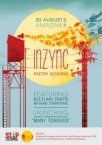
By Beverly Rycroft
I came to this collection with scant knowledge of L=A=N=G=U=A=G=E or concrete poetry. But even if the lively conversation between Profs Hambidge and Murray at the Cape Town launch hadn’t pointed me in the right direction, the poems themselves would have drawn me in.*
Otherwise Occupied is a playful yet fiercely hard-hitting meditation on being a woman: wife, mother , daughter, lover, sister, friend, observer. It’s a panorama of meticulous observations on women, men, the POTUS (President of the USA) our country and our history, presented in an array of voices. Most of all, it’s an energetic and finely-tuned exploration of language and what, in the words of WS Graham, “the language (is) using us for.”
The collection’s title demonstrates the multiplicity (and duplicity) of language. Partnering “Otherwise” with “Occupied” suggests, firstly, that the writer is occupied with serious matters like thinking and creating (as opposed to, say, cooking and cleaning). But it also suggests the writer is actively occupied with being “Otherwise”.
This is confirmed in the poem Little Joys, where the speaker exults in her otherwiseness : “Call me cynical. A bad-mouthed bitch not anyway feminine” (12), then goes on to claim, “I will never be voted Miss Congeniality…” (16). The “first and last time someone called me Baby was at birth” (18). That “and last” is crucial in a line that delivers one punch after another.
The tone of sassy self-knowledge in the poem is impossible to resist – or, for that matter, deride. By re-appropriating words like “bitch” as well as notions of being ladylike (“I can touch my toes and all the other / unladylike bits” [20-21]) the speaker disarms with laughter. At the same time, she highlights the ludicrous nature of the impossibly idealised female image in media.
This controlled, sharp and compassionate observation is directed, throughout the collection, to relationships ranging from love to grief; from Lady Gaga to Saartjie Baartman to self-harm; from a Lonmin widow to the world’s first lobotomies (practised on two unnamed women).
But it’s not just the language and its uses that provide the shock of the familiar.
The aesthetics of page and typography are carefully arranged to both challenge and reward the reader’s attention. Diagrams, use of white space, blocked-in headings and text, are employed to maximum effect.
In Also in 1948, for instance, two neurosurgeons duke it out in performing
lobotomies :
each man had his single turn on stage (15)
The fragmentation of these lines mimics the disjuncture and confusion of a tormented brain, while the lengths of white space between the words mockingly salute the self-importance and competitiveness of the surgeons. The detailed technical descriptions of the procedure (not for the faint-hearted) are aligned to the right of a block of white space, below which in stark contrast – lies our only information about the patients (other than that both are women):
(Fate of both patients: unrecorded.)
This manipulation of space and line is just one example of how the collection questions our passivity as readers.
The title Incredible But True Phoenomenon!, oozes irony in its mimicry of “click-bait” language used as far back as Henry Cesars’ exhibitions of Saartjie Baartman in Europe. The poem itself is an artful arrangement of prurient contemporary accounts of Baartman, archival documents (posters advertising a Private Exhibition, further “freak show” exhibits) and a poem written in Baartman’s own dignified, clear voice. In doing so, Murray creates a context for voyeurs to be judged on their own words.
It’s challenging to present tragedies like Baartman’s, as well as those of our country, in poems that are not clichéd, patronising or haranguing. Murray’s courage in tackling these subjects is mixed with a humility and skill that ultimately put the spotlight squarely on her subject. Read, for instance, Do not deliberately for a controlled anger that is also deeply moving.
Then there’s Darwin’s Deliberations. Headed and framed by quiet authorial comments , Murray presents words written by the great man himself on the verso of one of his notebooks: a debate on whether or not to get married.
In the “Marry” column Darwin writes
“…companion…who will feel
interested in one – object to be
beloved & played with – better than a
dog anyhow – ”
Murray’s titling and organization of Darwin’s text need say no more about how the father of evolutionary theory felt about women. The poem itself is a palimpsest of a 21st century female writer and thinker (“better than a dog anyhow”) superimposed on a blinkered (though eminent) Victorian male. Behind it, a mischievous inter-textual whisper from Carol Ann Duffy’s poem on Mrs Darwin, visiting the Zoo :
“I said to Him
Something about that Chimpanzee over there reminds me of you.”
From love to grief, anger to laughter, this collection offers an exhilarating ride. Lady Gaga’ s Super Bowl Performance Divides America is a must, as is Skyromancescope. And if you read nothing else, read Afterward for its poignant winding down from the anger and pain of grief to its human (and non-human) antidote.
Otherwise Occupied made me grin, weep, think and admire. Murray’s spirit and daring are underpinned by dexterity and rock-solid craft . Yet what I admire most is her humility and fearlessness in writing from whichever place – or person – calls out to her.
Previous generations might well have labelled this delightfully “otherwise” writer “a difficult woman”. For “difficult” read smart, curious, defiant, ironic, passionate, angry, witty and challenging. All of which characteristics are to be found in her poems.
*Read this interview on Joan Hambidge’s blog:
http://joanhambidge.blogspot.com/search?q=Otherwise+Occupied

 SLiPStellenbosch Literary Project
SLiPStellenbosch Literary Project 
